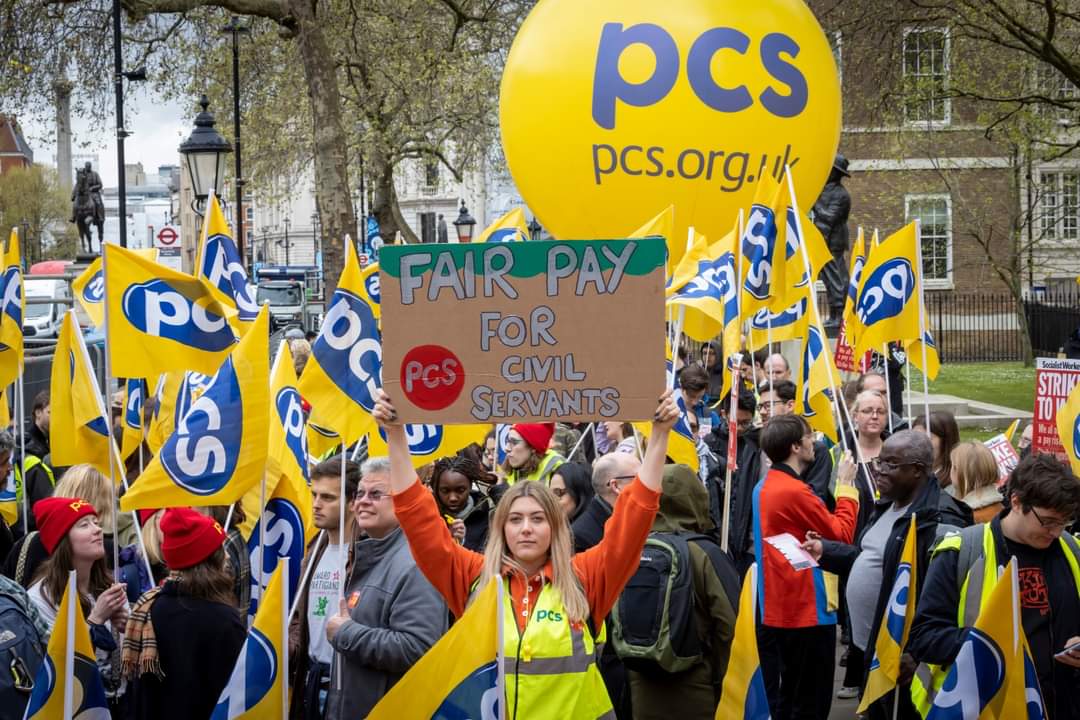By Left Horizons supporters in PCS
The Public and Commercial Services Union, PCS, will be electing a new General Secretary (GS) and Assistant General Secretary (AGS) over the next six weeks. It is an important trade union, the eighth largest in the TUC, with over 180,000 members, most of whom, to one degree or another, have been involved in a struggle about pay over the last year.
Although the old right wing in the union has long since been routed, the left in the union is currently in some disarray. Left Unity and the Broad Left Network are both putting up candidates in the elections, and the latter has agreed its list of candidates with the Independent Left grouping.
The candidates are as follows:
Left Unity (LU) Slate
Fran Heathcote (GS candidate) – Current PCS National President
Paul O’Connor (AGS candidate) – Appointed PCS Head of Bargaining & Secretary of the National Disputes Committee
Joint Broad Left Network (BLN) & Independent Left (IL) slate
Marion Lloyd (GS candidate) – Current PCS Group President in the BEIS Department
John Moloney (AGS candidate) – Current PCS AGS
It is to the credit of activists in PCS, and the hard work they have put in over many years, that there are no right-wing candidates to challenge the left in these elections. The right wing have been soundly discredited by their failure in the past to stand up to government bullying and the decline of wages and jobs.
But it is unfortunate that what was formerly a single vehicle for the left, Left Unity, has split irreconcilably. Both the main groups have their merits in that there are good candidates on both NEC slates, reflecting years of active work building the union at local and departmental level. They will have earned their votes by their hard work and their experience on their own merit and we would not argue with that.
Pay rise campaign strategy
The background to this election is the long campaign of the union for a decent pay rise. For the first time in the union’s history, through the efforts of activists at grass roots level, PCS managed to get over the government’s threshold of 50% for strike action. The PCS national campaign also includes the issues of pensions, job security and the civil service compensation scheme.
The strategy for industrial action developed by the Left Unity-led NEC was primarily based on sustained, targeted action involving selected groups of members in key areas of the civil and public services, backed up by all out national action, particularly where this could be coordinated with other unions. The sustained, targeted action attracted full strike pay for the members involved, financed by a levy of £3 or £5 per month (depending on salary) which was placed on all members.
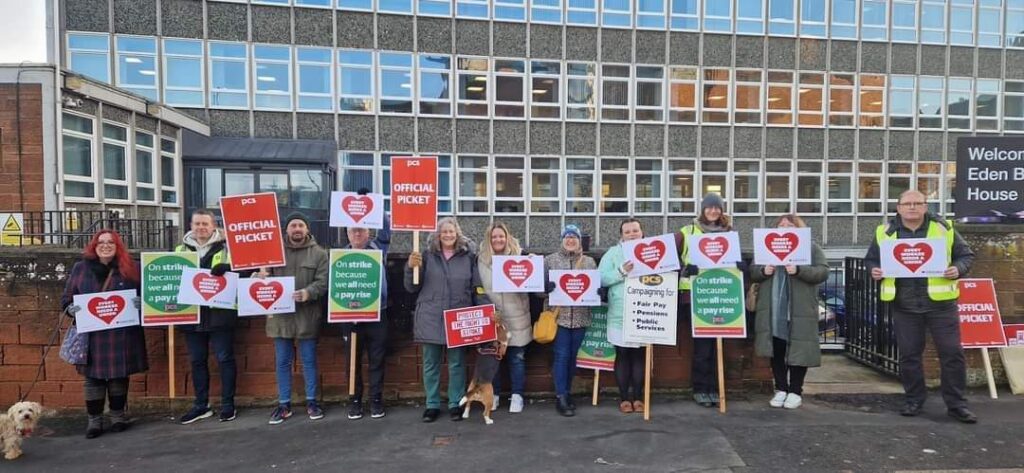
This strategy had clear merits, but it was too conservatively implemented. The campaign should have started with a day of national all-out action in late 2022, coordinated with other unions such as the RMT and CWU which were also taking national action at that time. This would have given all PCS members a feeling of having more involvement from the outset. However all out national action was not called until 3 months into the campaign. A total of only 3 days of that type of action took place prior to the end of May 2023 when the government made some concessions.
The sustained targeted action saw selected members out on strike for a number of weeks at various times between December 2022 and May 2023 in The Border Force, The Passport Office, The Rural Payments Agency, the DVLA, the DVSA, Highways England, The Animal and Plant Health Agency, The DWP and other areas. However the levy rates of only £3 and £5 per member per month proved to be insufficient to sustain a rolling campaign of targeted action that involved sufficient numbers of members over a long enough period.
Government concessions
In late May, as a result of the action that was taken, the Government announced some concessions. These were as follows:
- A £1,500 non-consolidated lump sum cost of living payment in addition to the 2% to 3% members had already received for in 22/23. Payment of this was not conditional on PCS ending the dispute.
- An increase in the headline pay remit figure for 23/24 from 2% to 4.5%, with an extra 0.5% for the lowest paid.
- A commitment to further talks on low pay and greater coherence of pay across the civil service.
- Postponement of plans to cut the Civil Service Compensation Scheme until after the next general election.
- A commitment to further talks on strengthening redundancy avoidance measures
Whilst these concessions are not insignificant, it should have been clear that an additional non-consolidated amount for 22/23 was insufficient to draw a line under that year’s pay award. After all, the inflation during this cost-of-living crisis is fully consolidated into prices! The PCS national pay claim for 22/23 was for a 10% fully consolidated increase underpinned by a £15 per hour living wage to compensate for the decline in real wages over the previous 12 years.
Additionally, the increase in the civil service pay remit for 23/24 from 2% to 4.5% – 5% is still below inflation and will mean a further pay cut in real terms.
A big mistake
A big mistake was made by the Left Unity-led NEC in its response to these concessions. Rather than looking to temporarily wind down the campaign at the first sign of any concessions, they should have shown real left leadership and taken a risk by seeking approval from members to ramp up the campaign to keep the pressure on the government over the summer, including seeking approval for further all out national action and an increase in the levy to fund more sustained, targeted action.
Instead they effectively put in place a 3-month consultation period, first by taking soundings from branches and then by holding a consultative ballot which sought approval from members for ‘pausing’ action until the outcome of 23/24 delegated pay talks across all individual civil service departments, and then taking stock and deciding whether to pursue further strike action.
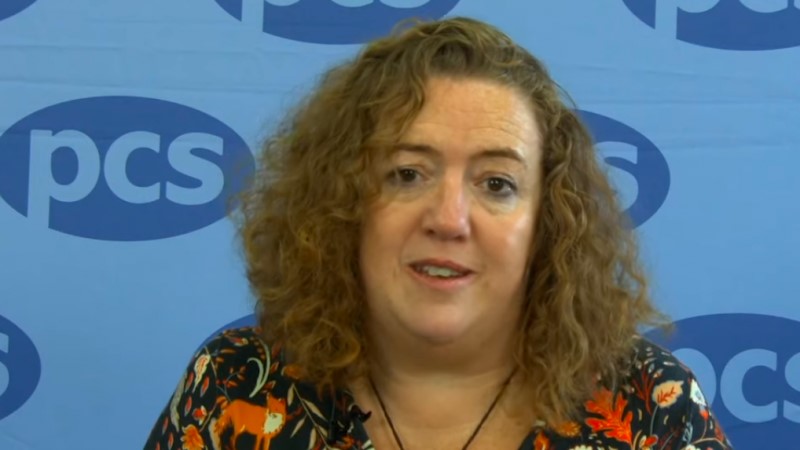
By enforcing a full 3 months of consultation the NEC effectively took the legitimate option of continuing action over the summer off the table, so that the only option given to members to continue the dispute was the NEC’s strategy of the ‘pause.’ Therefore, it was no surprise that members voted by a massive majority to endorse this option.
Now that the NEC strategy of ‘pausing’ action has been endorsed by members, the demand should be that all members in pay bargaining units that have a 23/24 pay award imposed, and which is based on the Govt’s remit of 4.5% to 5%, should be balloted for further strike action.
The tactics employed by the national leadership in the dispute left many activists dismayed. Despite the hard work of reps and activists to secure a mandate for national strike action, there was no attempt to keep momentum by using the concessions already won from the government to mobilise members for further action with the aim of winning additional concessions that would take us closer to our national pay claim demands.
Splits in the left
The splits in the Left within PCS long pre-date these recent developments in the national campaign. However, the alienation of much of the activist base from the leadership of Left Unity as a result of these developments make it far from certain that the Left Unity candidates will emerge victorious in these elections.
Left Unity has been the dominant faction in PCS for over two decades now, despite 2 splits away from it, and much of the union bureaucracy at senior levels is now supportive of it. There is more than a hint that Fran Heathcote is their ‘favourite’ – she was even described by the outgoing General Secretary, Mark Serwotka, as “the next general secretary”.
As if this arrogant presumption wasn’t enough, Fran Heathcote, who is chair of Left Unity, announced her candidature without any consultation with the LU membership. Other Left Unity members were given just over a week to also self-nominate, which is a far cry from the full democratic process of area meetings and hustings that happened in the past. The excuse used was that the other factions would quickly have their candidates in place and their campaigns up and running, but even if that was the case, it is clear that this truncated form of internal democracy is not the sign of a healthy, grassroots, left organisation.
Not surprisingly, many activists in LU objected to being taken for granted in this way and have moved across to the Broad Left Network. That is in addition to those LU members who were disaffected by the union leadership’s industrial strategy. There is a feeling among many LU members that as a ‘left’ organisation, it is merging itself into the union bureaucracy and is itself becoming bureaucratised.
On the other hand, Left Horizons has serious misgivings about the candidates of the Broad Left Network – Marion Lloyd and John Moloney.
Labour Party policy
The BLN website argues “PCS should not give a blanket endorsement to any political party”. Bearing in mind that no other party, would be likely to get the union’s support, this is code for saying that the union should not support the Labour Party. Further, the website adds, “We note the support of the RMT for the Trade Unionist and Socialist Coalition (TUSC) and welcome this as a positive step towards an independent political voice for the working class”. Supporting TUSC is in no way a “positive step”; it is taking the union down a rabbit hole that leads nowhere. In any case, even the RMT is no longer affiliated to TUSC!
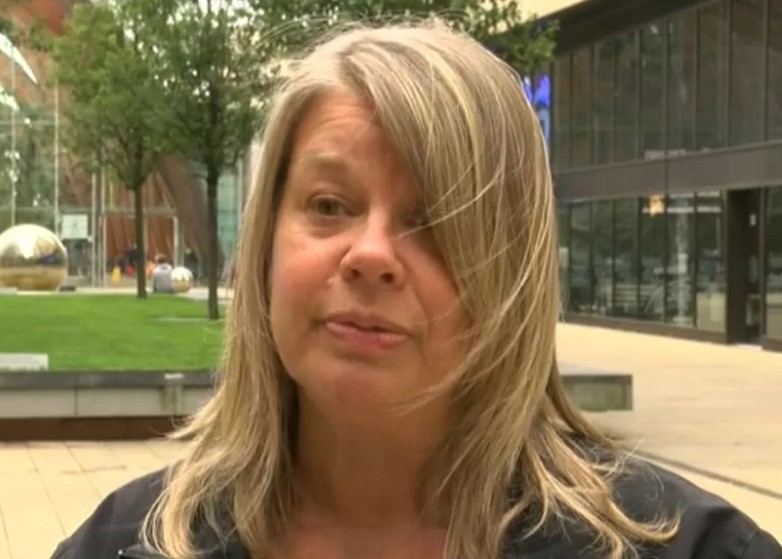
and Independent Left Candidate
Additionally when Marion Lloyd last stood for election for PCS General Secretary in 2019, she opposed the PCS National Executive Committee (NEC) policy of calling for members in England and Wales to vote for Labour in the 2019 general election, which was also taking place at that time. This was the first time that PCS had made such a call to members during a general election campaign (This call did not extend to voters in Scotland because of the high level of support for independence and the SNP there).
Instead, Lloyd only asked for PCS members to support candidates who supported PCS policies. It is true that this was conference policy, adopted through a Left Unity motion which had been supported by both Mark Serwotka and Fran Heathcote at the time. However, the union’s policy regarding supporting candidates and political parties had naturally evolved since Jeremy Corbyn was elected as Labour Leader – and why wouldn’t it have, given that Labour’s programme by that stage included such items as an immediate above inflation pay rise for civil servants, the return of national pay bargaining across the civil service, and the abolition of all anti trade union laws?
It was clear that the PCS NEC support for Labour was based on these elements of its programme in particular, but Marion Lloyd opposed this, giving a disingenuous excuse that it would mean calling on PCS members to vote for right wing Labour candidates like Rachel Reeves or Wes Streeting in many cases. In reality, she was putting the sectarian interests of her own party, the Socialist Party (SP), and its TUSC front organisation, before the interests of PCS members.
The BLN may be right to blame the national leadership for what appeared to be dithering and indecision over many weeks of strike action, but even in this case, their criticisms of the union leadership’s conduct of the recent pay struggle can be rather facile at times. In the wave of strikes that has encompassed many industries and unions in the past year and a half there has not been one single union that has had an all-out or even a prolonged national strike. Neither Left Unity nor BLN have outlined in detail, department by department, how they would have the members mobilised for more extensive national action.
Member led-organising
There is one very important redeeming feature in the organisation of the BLN – at least it still functions as a member-led grouping! Unlike in Left Unity, the selections of Lloyd and Moloney as BLN candidates, were decided through a full consultation with members. It is also true that open discussion and disagreement is allowed within the BLN. Although the Socialist Party is the leading force within it, not all BLN members or even members of their slate for elected positions agree with the SP and/or support TUSC – far from it! And that is as it should be.
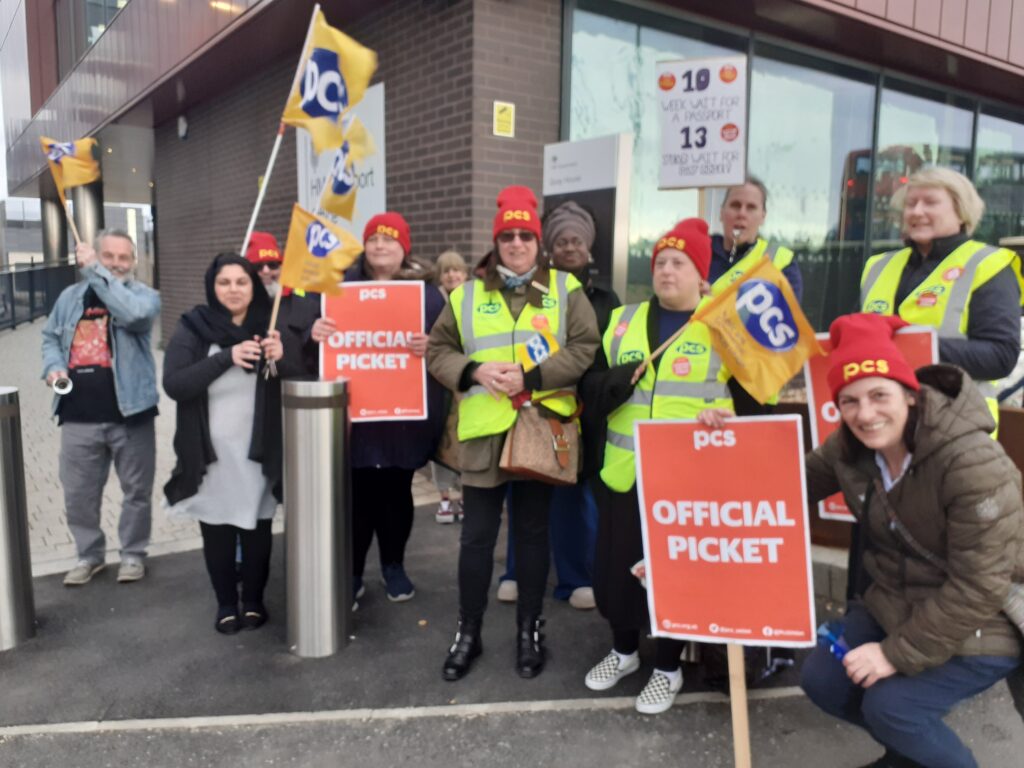
It is not clear what the election outcome will be. Unfortunately, the turnout at the last GS election was only 18.6% and if it is something similar this time, it will be difficult to predict an outcome. In a bid to engage members and improve voter turnout, and in line with the basic principles of democratic accountability, all candidates seeking election to these senior full-time positions within the union should be willing to submit themselves to members’ hustings during the election campaign.
Sadly, the LU candidates, Heathcote and O’Connor, have had a poor record regarding attending hustings and have announced that they were not going to accept any further invitations, claiming that that they are mainly attended by activists who have already made up their minds. Hustings have sometimes proceeded with only BLN candidates participating and this has not gone down well with many active members.
The key to maintaining a good solid left leadership and a militant union that fights for its members’ pay and conditions is not just winning key elections – important as that is – but having an effective, large and, crucially, democratic broad left grouping that spans every department and region of the union. That should be the main focus of socialist activists in PCS in the future, minimising the risk of a return of the old union right wing.

